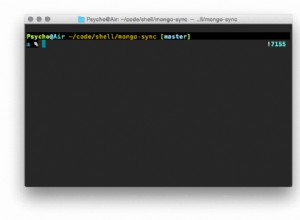Мисля, че това е хубава идея, но трябва да го направите сами, няма вградена поддръжка за това. Ако имате слой за достъп, можете да го направите там. Ще ви трябва клас атрибут, нещо подобно;
public enum IndexConstraints
{
Normal = 0x00000001, // Ascending, non-indexed
Descending = 0x00000010,
Unique = 0x00000100,
Sparse = 0x00001000, // allows nulls in the indexed fields
}
// Applied to a member
[AttributeUsage(AttributeTargets.Property | AttributeTargets.Field)]
public class EnsureIndexAttribute : EnsureIndexes
{
public EnsureIndex(IndexConstraints ic = IndexConstraints.Normal) : base(ic) { }
}
// Applied to a class
[AttributeUsage(AttributeTargets.Class)]
public class EnsureIndexesAttribute : Attribute
{
public bool Descending { get; private set; }
public bool Unique { get; private set; }
public bool Sparse { get; private set; }
public string[] Keys { get; private set; }
public EnsureIndexes(params string[] keys) : this(IndexConstraints.Normal, keys) {}
public EnsureIndexes(IndexConstraints ic, params string[] keys)
{
this.Descending = ((ic & IndexConstraints.Descending) != 0);
this.Unique = ((ic & IndexConstraints.Unique) != 0); ;
this.Sparse = ((ic & IndexConstraints.Sparse) != 0); ;
this.Keys = keys;
}
}//class EnsureIndexes
След това можете да приложите атрибути на ниво клас или член, както следва. Открих, че добавянето на ниво член е по-малко вероятно да излезе от синхрон със схемата в сравнение с добавянето на ниво клас. Разбира се, трябва да се уверите, че получавате действителното име на елемента, а не името на члена на C#;
[CollectionName("People")]
//[EnsureIndexes("k")]// doing it here would allow for multi-key configs
public class Person
{
[BsonElement("k")] // name mapping in the DB schema
[BsonIgnoreIfNull]
[EnsureIndex(IndexConstraints.Unique|IndexConstraints.Sparse)] // name is implicit here
public string userId{ get; protected set; }
// other properties go here
}
и след това във вашата реализация за достъп до DB (или хранилище), имате нужда от нещо подобно;
private void AssureIndexesNotInlinable()
{
// We can only index a collection if there's at least one element, otherwise it does nothing
if (this.collection.Count() > 0)
{
// Check for EnsureIndex Attribute
var theClass = typeof(T);
// Walk the members of the class to see if there are any directly attached index directives
foreach (var m in theClass.GetProperties(BindingFlags.Public | BindingFlags.NonPublic | BindingFlags.Instance | BindingFlags.FlattenHierarchy))
{
List<string> elementNameOverride = new List<string>(1);
EnsureIndexes indexAttr = null;
// For each members attribs
foreach (Attribute attr in m.GetCustomAttributes())
{
if (attr.GetType() == typeof(EnsureIndex))
indexAttr = (EnsureIndex)attr;
if (attr.GetType() == typeof(RepoElementAttribute))
elementNameOverride.Add(((RepoElementAttribute)attr).ElementName);
if ((indexAttr != null) && (elementNameOverride.Count != 0))
break;
}
// Index
if (indexAttr != null)
{
if (elementNameOverride.Count() > 0)
EnsureIndexesAsDeclared(indexAttr, elementNameOverride);
else
EnsureIndexesAsDeclared(indexAttr);
}
}
// Walk the atributes on the class itself. WARNING: We don't validate the member names here, we just create the indexes
// so if you create a unique index and don't have a field to match you'll get an exception as you try to add the second
// item with a null value on that key
foreach (Attribute attr in theClass.GetCustomAttributes(true))
{
if (attr.GetType() == typeof(EnsureIndexes))
EnsureIndexesAsDeclared((EnsureIndexes)attr);
}//foreach
}//if this.collection.count
}//AssureIndexesNotInlinable()
Тогава EnsureIndexes изглежда така;
private void EnsureIndexesAsDeclared(EnsureIndexes attr, List<string> indexFields = null)
{
var eia = attr as EnsureIndexes;
if (indexFields == null)
indexFields = eia.Keys.ToList();
// use driver specific methods to actually create this index on the collection
var db = GetRepositoryManager(); // if you have a repository or some other method of your own
db.EnsureIndexes(indexFields, attr.Descending, attr.Unique, attr.Sparse);
}//EnsureIndexes()
Обърнете внимание, че ще поставяте това след всяка актуализация, защото ако забравите някъде, вашите индекси може да не бъдат създадени. Ето защо е важно да се уверите, че оптимизирате повикването, така че да се върне бързо, ако няма индексиране, което да се направи, преди да преминете през целия този код за отразяване. В идеалния случай бихте направили това само веднъж или най-малкото веднъж на стартиране на приложение. Така че един от начините би бил да използвате статичен флаг, за да проследите дали вече сте го направили, и ще ви е необходима допълнителна защита за заключване около това, но прекалено опростено, изглежда по следния начин;
void AssureIndexes()
{
if (_requiresIndexing)
AssureIndexesInit();
}
Така че това е методът, който ще искате във всяка актуализация на БД, която правите, който, ако имате късмет, ще бъде включен и от JIT оптимизатора.




